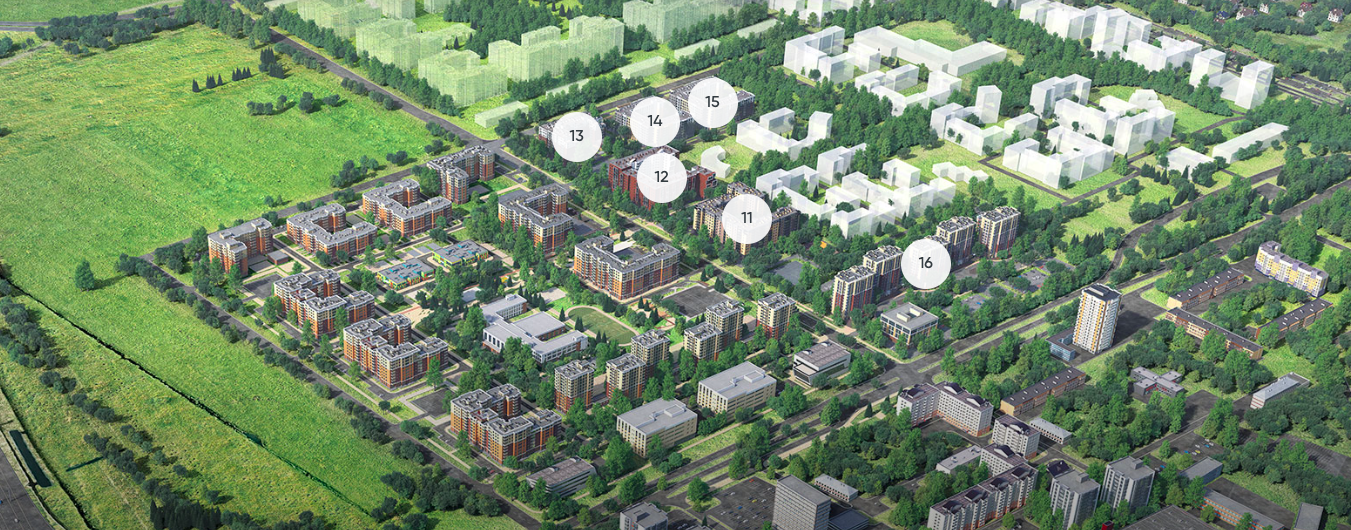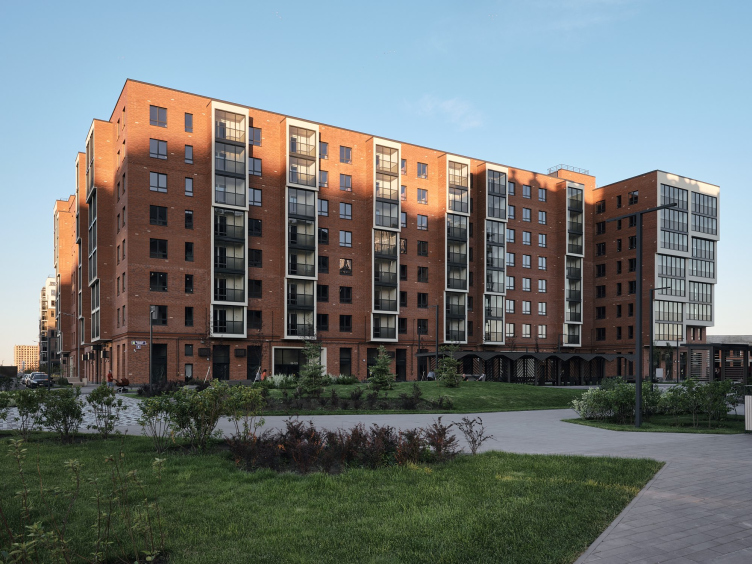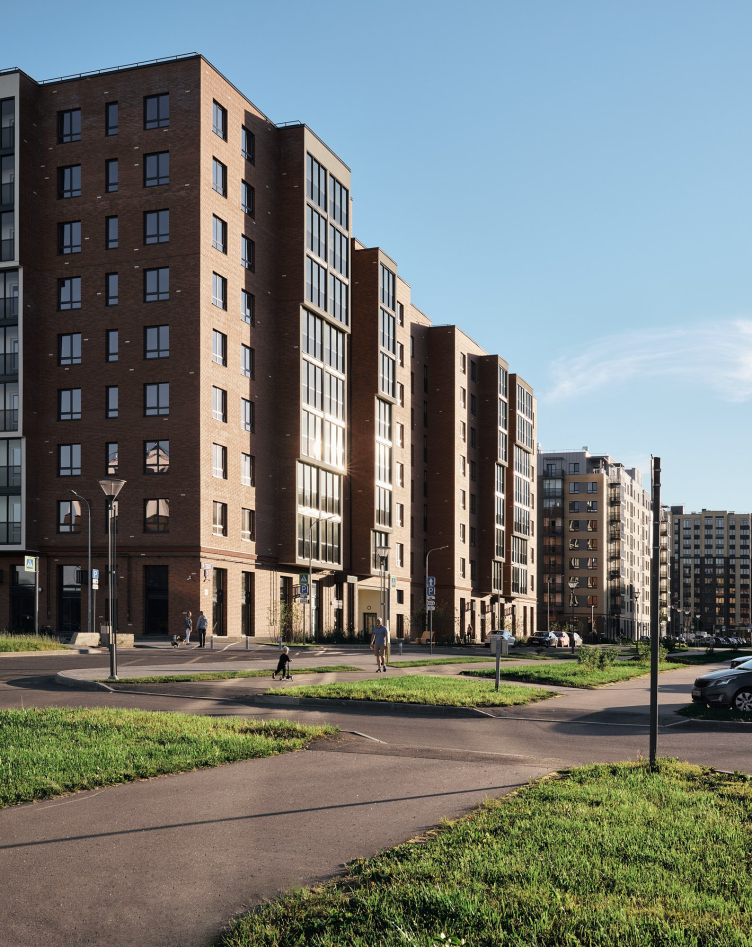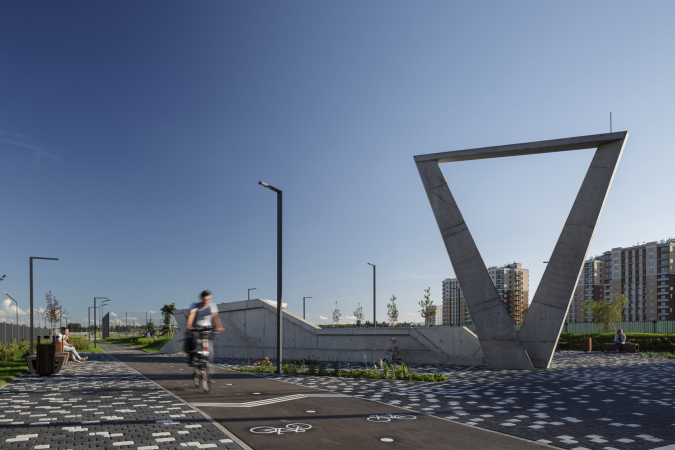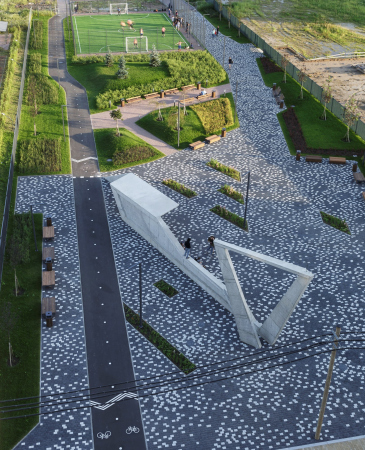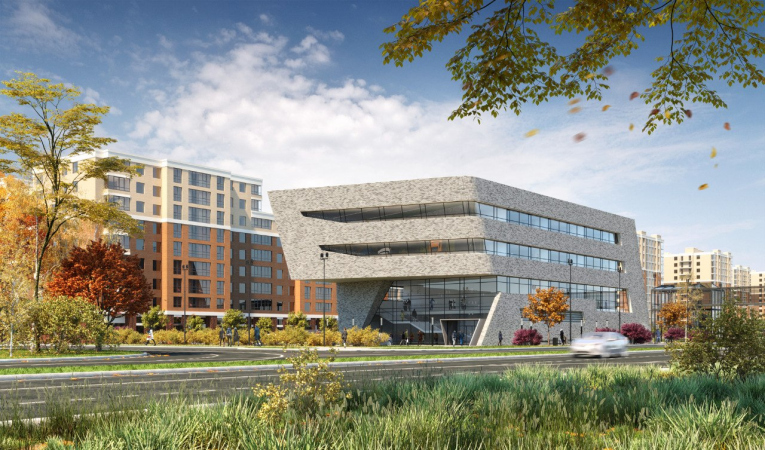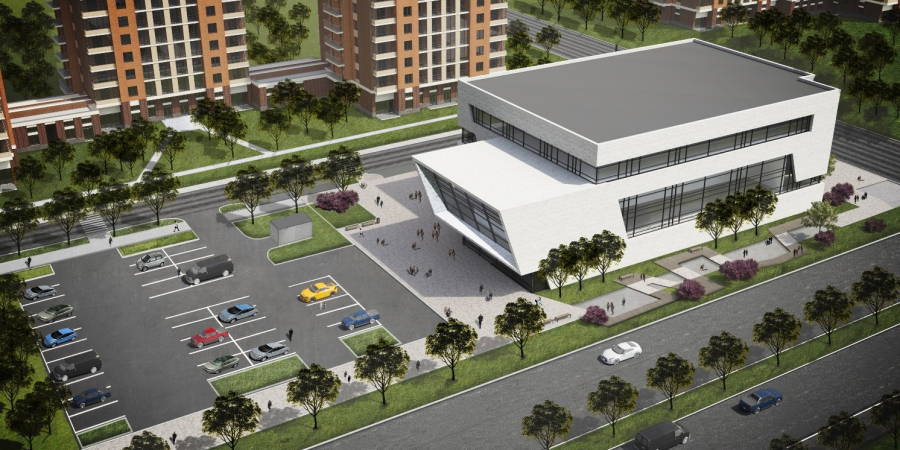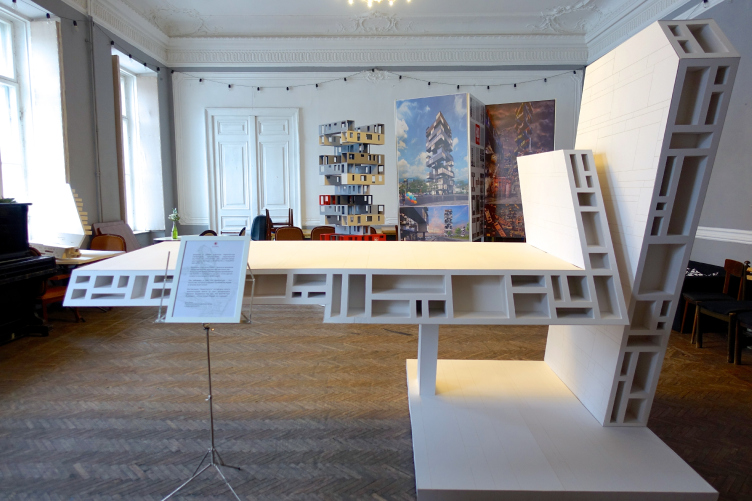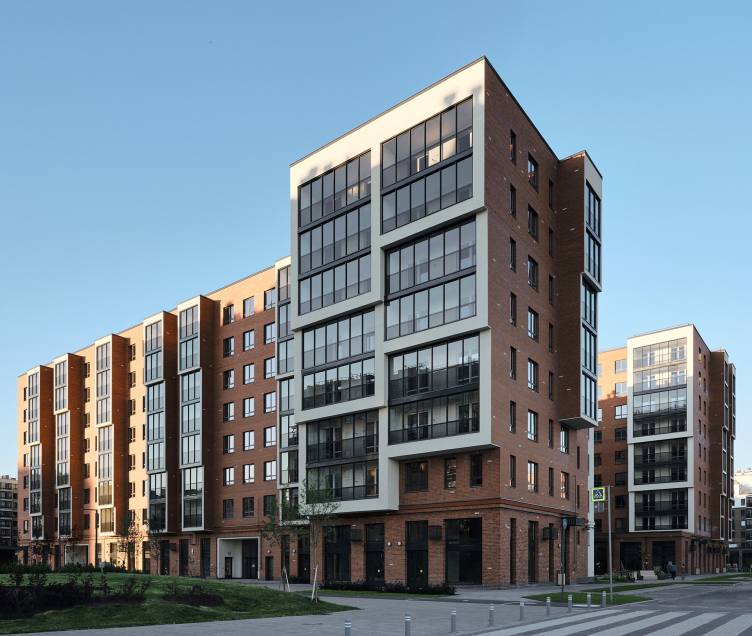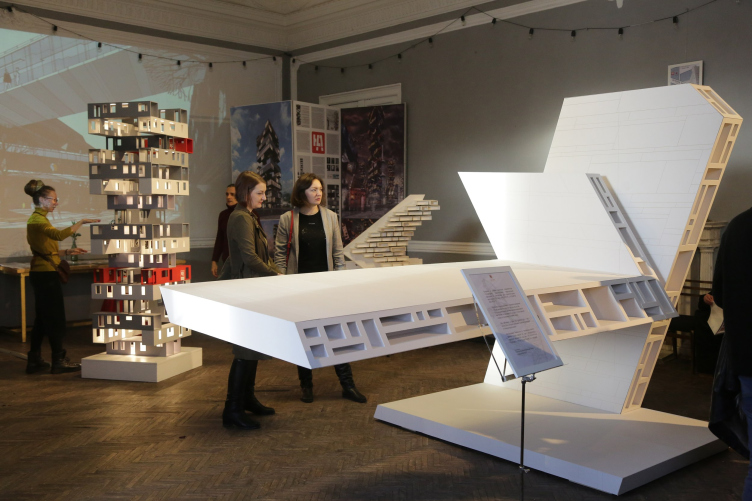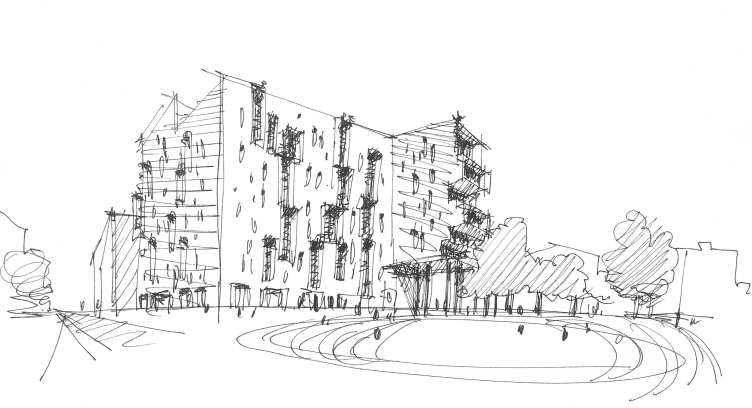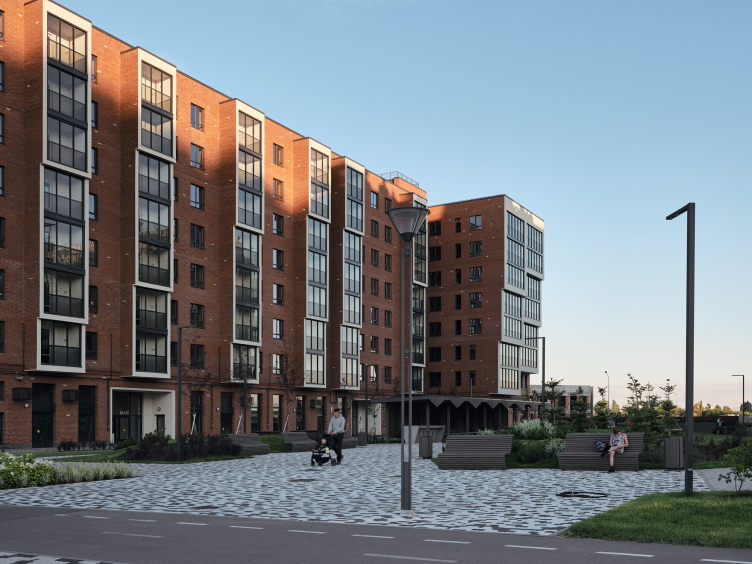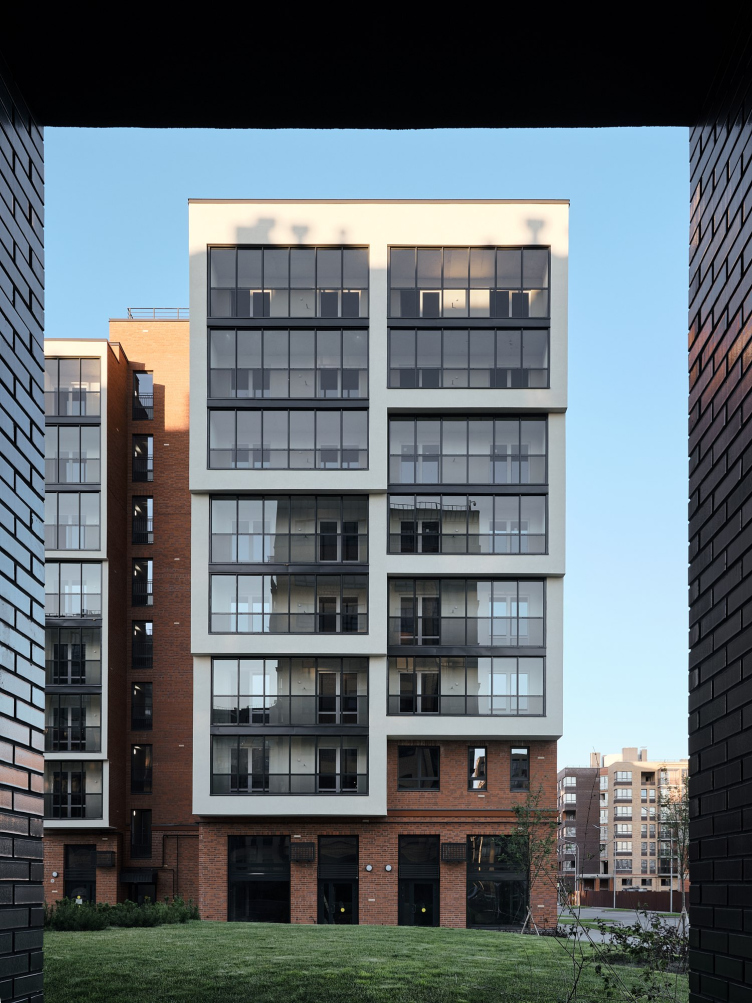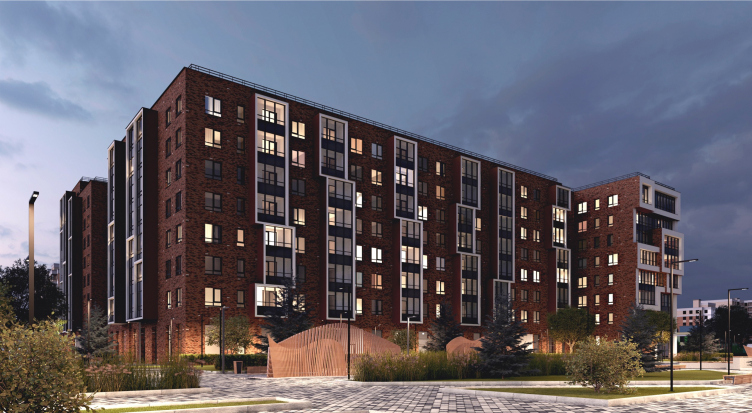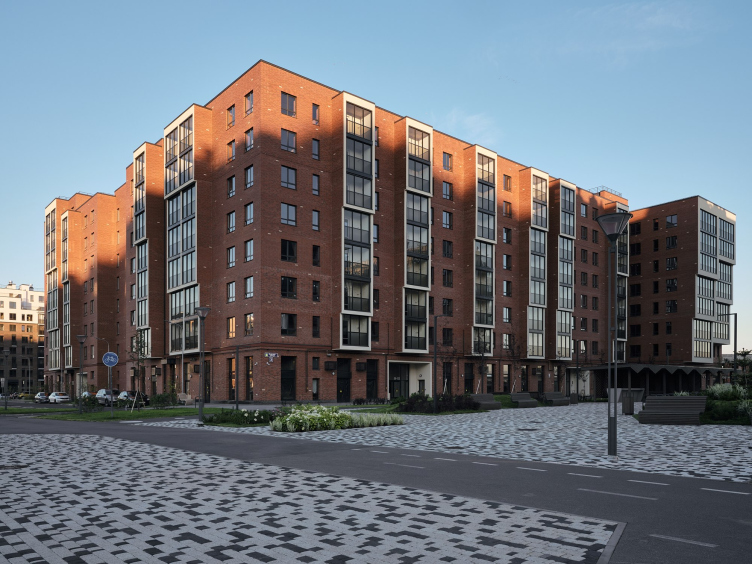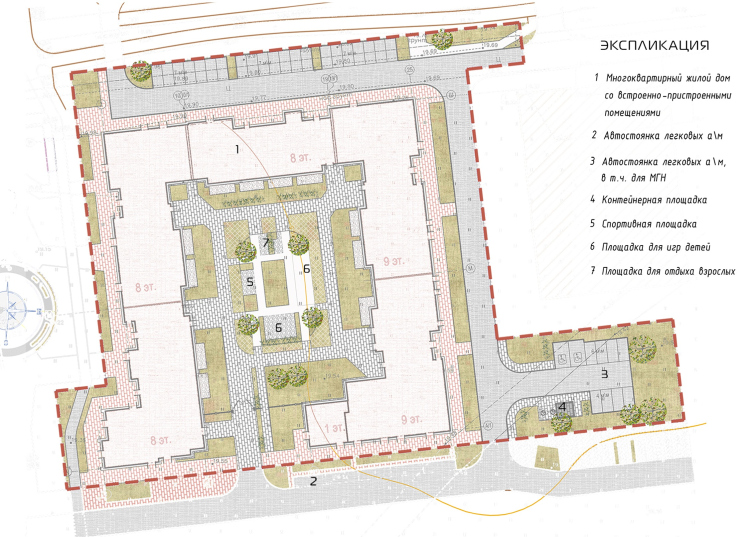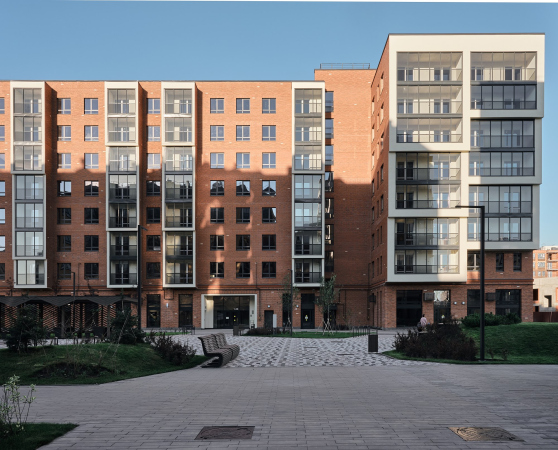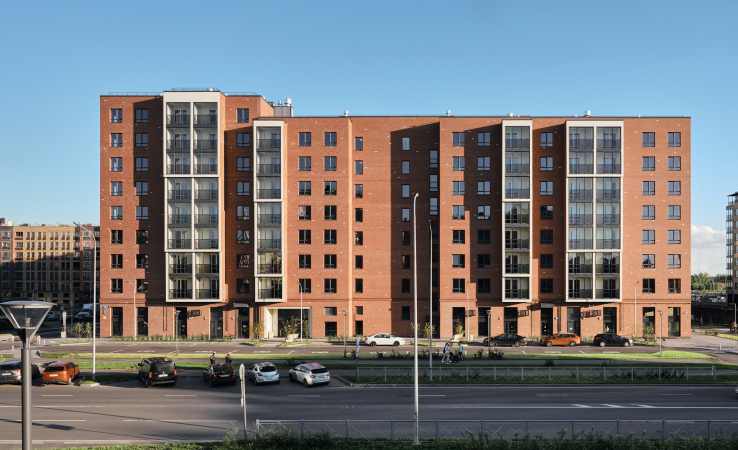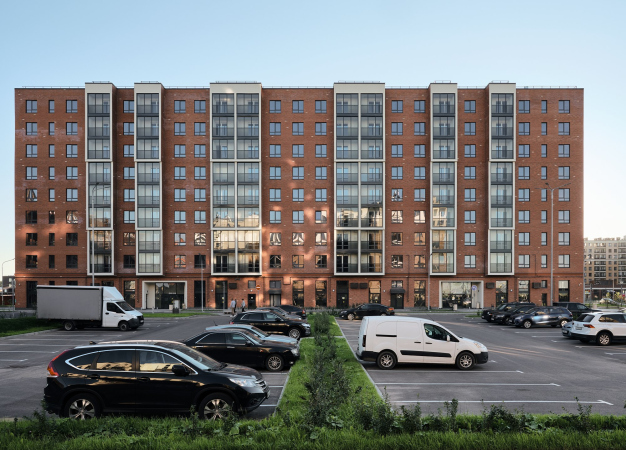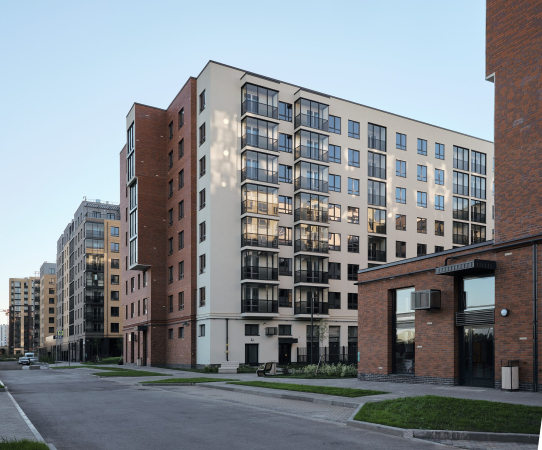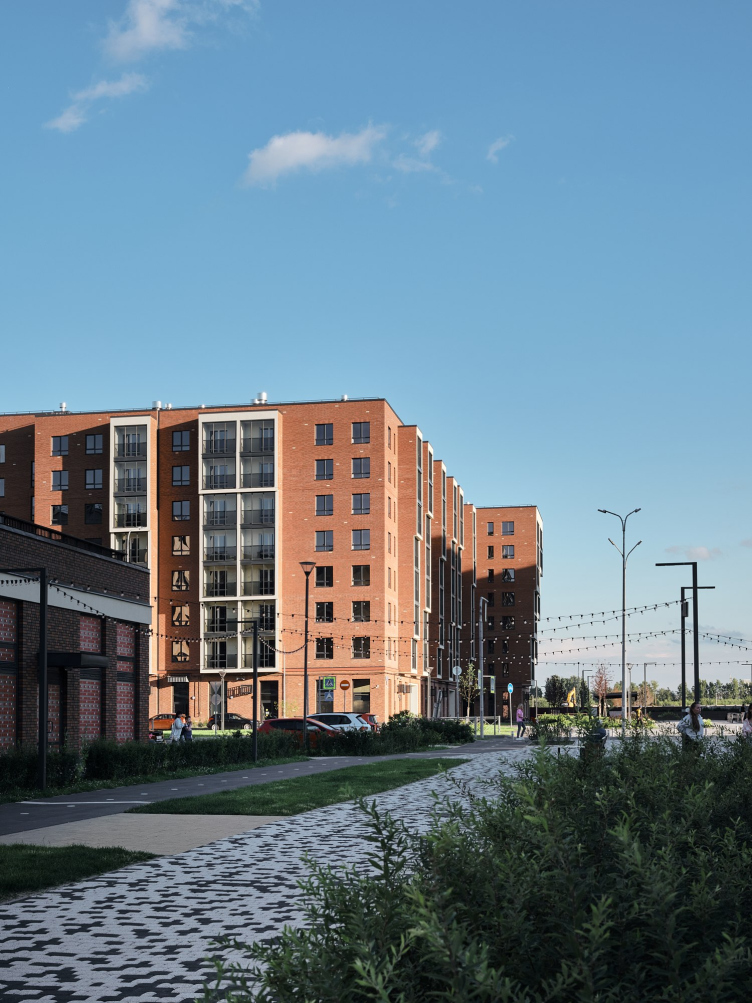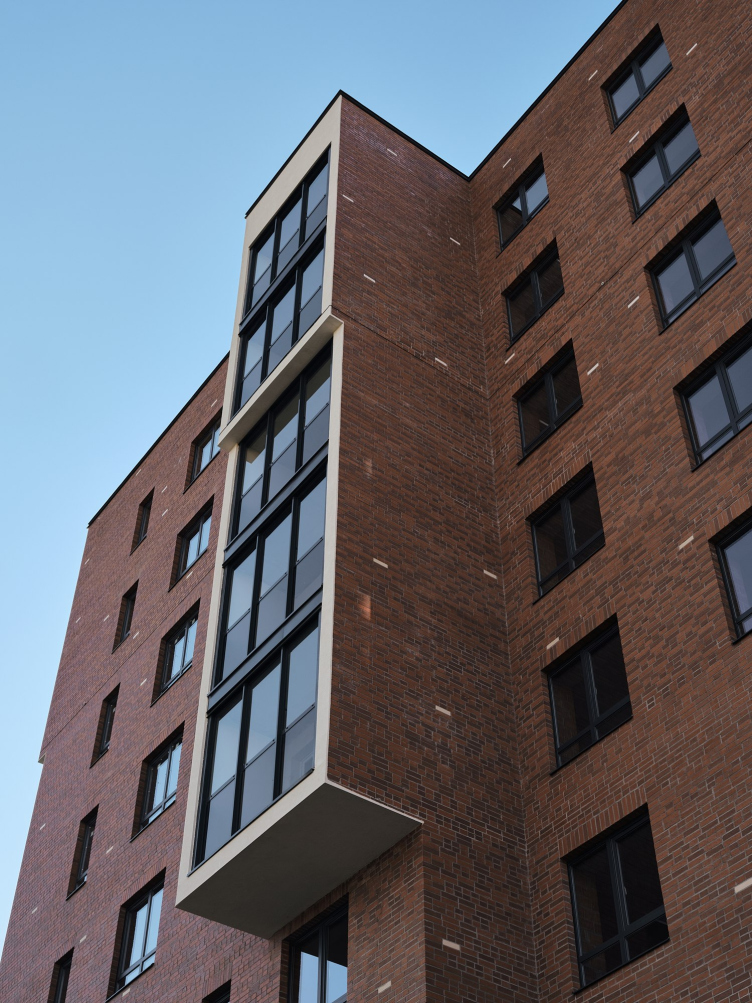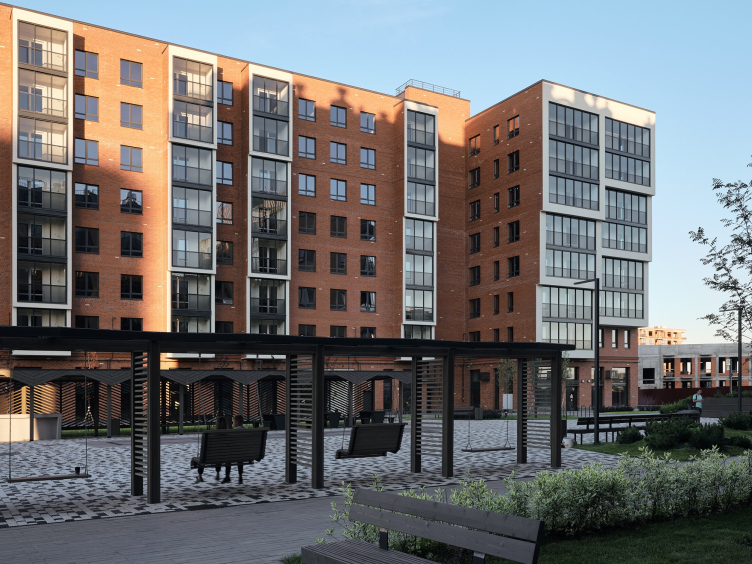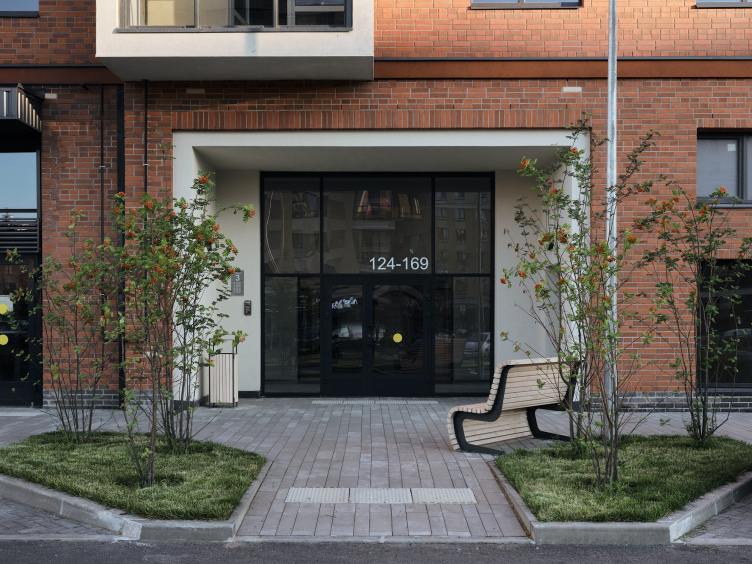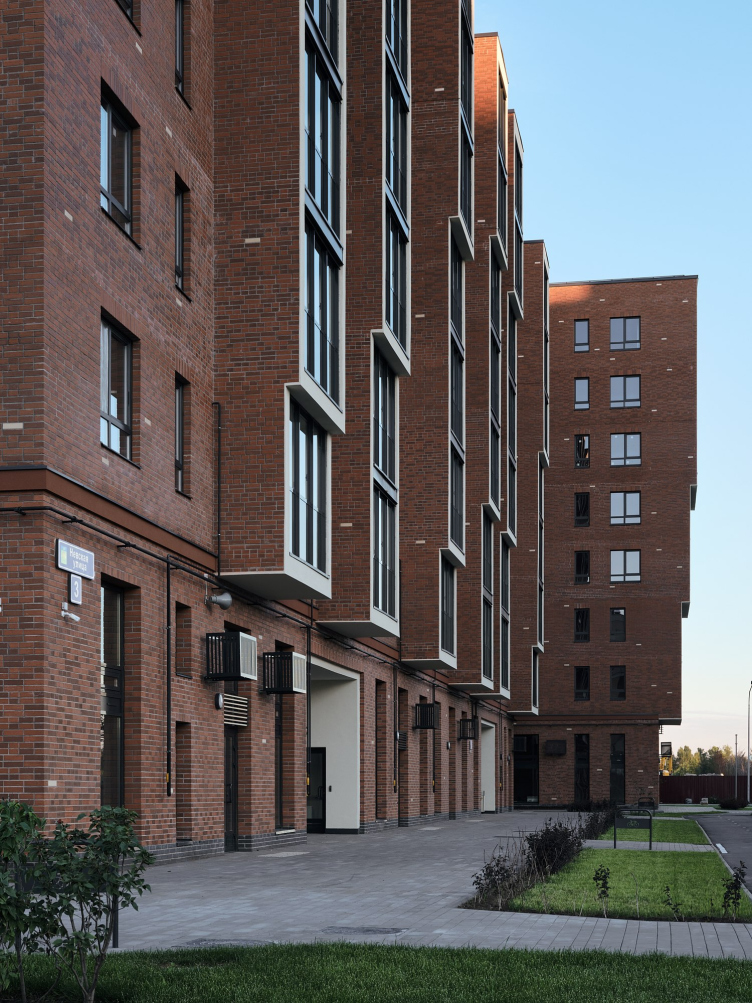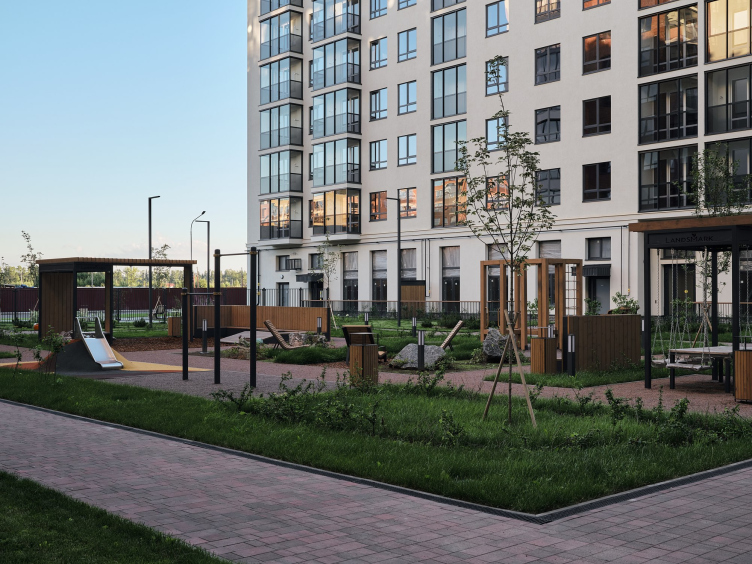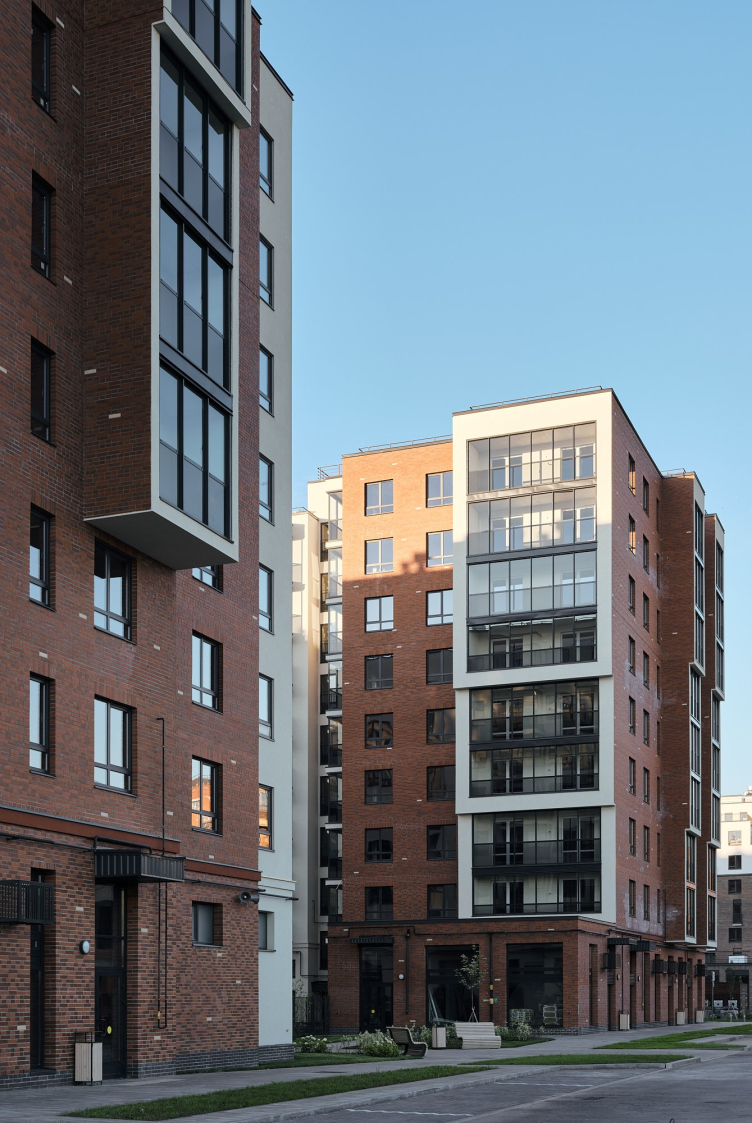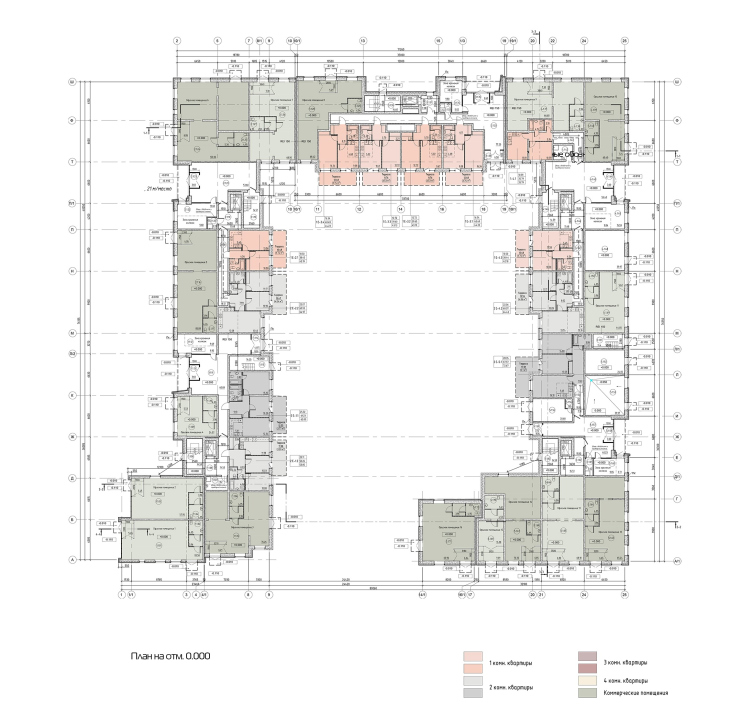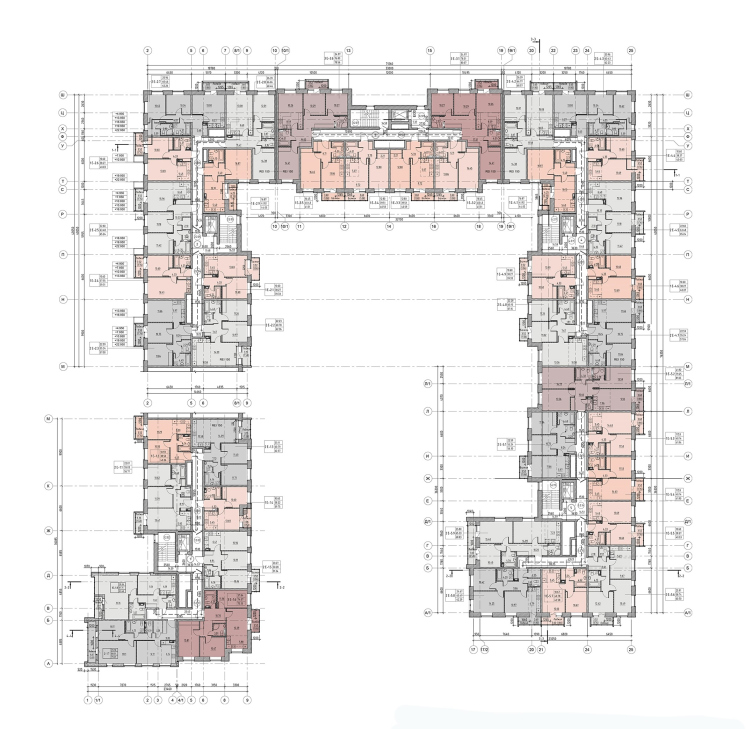The master plan of New Peter residential area
Copyright: © Photo courtesy by Construction Trust
New Peter residential area
Copyright: Photograph © Dmitry Tsyrenshchikov / provided FUTURA-ARCHITECTS
The project has been developing since 2014, and, for its time and location, and even for St. Petersburg, it has a whole number of innovative solutions. For example, all the houses have brick external walls, and there are no studios in them – the area of the apartments starts from 35 square meters, the height of the buildings does not exceed 12 floors, and the master plan, developed by the architectural studio M4, in addition to schools and kindergartens, has public life facilities in it – a linear park several kilometers long, a business center, and a sports and fitness complex. The first houses were also built by M4 projects, and in the more recent stages the developer went even further – they divided the land sites into lots and began inviting different architects to design them.
New Peter residential area
Copyright: Photograph © Dmitry Tsyrenshchikov / provided FUTURA-ARCHITECTS
The commission to design Lot 12 was scored by Futura Architects, which was preceded by a rather lengthy story. The architects began working with New Peter still in 2014 from the White Nights Boulevard – a linear park that will run through all the segments of the complex. A part of the boulevard has already been built, and its beginning is marked by an abstract figure of an abstract sign – the already recognized “signature” of Futura Architects. In 2017, the boulevard received the Silver Sign award at Zodchestvo festival, after which the architects received an order for a fitness center and a business center – both are at different stages of completion.
In 2019, Futura Architects made for the “Manifesto” exhibition, which took place within the framework of the St. Petersburg Architectural Biennale, an installation that impressed the developer and became the basis of the future house.
Manifesto Exhibition
Copyright: Photograph © Alena Kuznetsova, Archi.ru
Lot 12 occupies an important place in the structure of this area – it is situated at the crossing of Nevskaya Street and White Nights Boulevard; it is clearly viewable from the main square and remote vantage points of the boulevard park. This inspired the architects to design this house as a landmark. However, since the input parameters and the measurements of all the houses were identical, this task had to be solved by color and plastique means.
The idea to make “the most brick” building on the block was something that the client liked at once. The terra cotta color, clear-cut and simple shapes of the bay windows, clad in brick, and the random pattern of white bricks on the façade that look like falling snowflakes – all of this let us tear the project from the context and make it even more colorful and daring.
New Peter residential area
Copyright: Photograph © Dmitry Tsyrenshchikov / provided FUTURA-ARCHITECTS
The plastique solutions were based on that same installation from the Manifesto exhibition. Yes, one must recognize that the similarity between this installation and the house is not really obvious, yet upon a closer look everything is readable quite clearly. The combination of a slender tower and a cantilever, which looks like a horizontal skyscraper, transformed into a contrast between the squatting brick masonry and the soaring white cascades of bay windows and recessed balconies. The cells of the apartments, so diverse in the installation, became more uniformed to a certain degree but they still show through in the cascades that stand out from the volume at different depths.
Installation at the Manifesto Exhibition
Copyright: © FUTURA-Architects
New Peter residential area
Copyright: © FUTURA-Architects
New Peter residential area
Copyright: Photograph © Dmitry Tsyrenshchikov / provided FUTURA-ARCHITECTS
Comparing the installation and the actual house tempts one to make jokes in the spirit of “expectation vs reality”, like, this is what happens to the architect’s dreams when they hit the heartless market. This joke, however, will be pretty shallow because the project and its subsequent implementation were not done by chance, naivety or lack of experience. When faced with the task of designing comfort class housing in Novoselie, the architect made a reality something that they had been inwardly longing for. In architecture, just as in theater, there must not be “small” roles – you have to put a piece of your soul in every project.
New Peter residential area
Copyright: Photograph © Dmitry Tsyrenshchikov / provided FUTURA-ARCHITECTS
The absence of accidental solutions is clearly seen if you compare the 3D render and the ready house. One can see that the things that are gone are the “dancing” shift of the bay windows and the “cell-like” quality of the bay windows; one can also see the struggle for the cascades that could have easily been arrayed in one plane – but on the whole the pictures are similar.
New Peter residential area
Copyright: © FUTURA-Architects
New Peter residential area
Copyright: Photograph © Dmitry Tsyrenshchikov / provided FUTURA-ARCHITECTS
On the plan, the building is essentially a courtyard that opens up southward – in the direction of the future kindergarten. The volumes of the bay windows and recessed balconies, as well as the recessions and the increase of one of the sections from eight to nine floors make all the three street facades “working” and slightly different in their structure. The side wall from the side of the White Nights Boulevard could have been interpreted as a firewall in other circumstances, but here it turned into a textured “fracture” that makes one remember the concept of metabolism – its openness to the outside world will inevitably start a dialogue with the neighboring building.
The master plan. New Peter residential area
Copyright: © FUTURA-Architects
When you examine the viewing angles created and the materials used, you see the architects’ adherence to the “old school” fundamentals: the building must look attractive from 200, 20, and 2 meters away. From the remote perspectives, the house attracts the observer with its colors, a cascades silhouette, and a mass that was able to avoid being fractured by horizontal details – and this is what makes it different from the surroundings. From the square next to Nevskaya street, the house opens up with its entire length and intrigues the observer with its bay windows and recessed balconies; inclusions of white brick become visible that echo the paving pattern.
New Peter residential area
Copyright: Photograph © Dmitry Tsyrenshchikov / provided FUTURA-ARCHITECTS
Crossing the street, the observer will see an intricate pattern of terra cotta brick: it has a curious logic of its own, not Bavarian, not bonder, and not all-stretcher.
The masons were given detailed technological maps for laying red bricks, yet at the same time we allowed a possibility of moving away from these charts now and then. Thus, each new floor and each new section took on a unique character of their own. In the masonry, you can notice a horizontal stretching of the pattern, or, conversely, a very frequent change of color – sometimes, it is even an ancient Celtic pattern with rhombuses and crosses. Someone may see symbols in these drawings, someone may see a reflection of wildlife, but one thing is for sure – it is impossible to build another such building. The pattern is as diverse as our society is. Thus, the builders took a full part in the formation of a truly authentic project.
New Peter residential area
Copyright: Photograph © Dmitry Tsyrenshchikov / provided FUTURA-ARCHITECTS
The “laying bare” of the white color in the body of the building gives it a second layer – not material but rather of a conceptual nature. While the brick is perceived as the “skin” or the “shell” of the building, the white stucco is perceived in different ways depending on the viewing angle: from the outside – as from the outside – as the exit of ancient geological rocks to the surface or as living tissues ready to grow further, from the inside – as pulp or as a lining.
New Peter residential area
Copyright: Photograph © Dmitry Tsyrenshchikov / provided FUTURA-ARCHITECTS
New Peter residential area
Copyright: Photograph © Dmitry Tsyrenshchikov / provided FUTURA-ARCHITECTS
New Peter residential area
Copyright: Photograph © Dmitry Tsyrenshchikov / provided FUTURA-ARCHITECTS
The yards in “New Peter” are closed-door and they differ from one another – according to the developer’s plan, this must encourage the residents to meet and then visit one another more often. A special feature of Lot 12 is a small Zen garden with sun loungers, a gazebo, and a communal table under a canopy. The ground floor apartments facing the courtyard have quite spacious terraces. Outside, the outline of the building is occupied by commercial premises. From the second to the ninth floors there are 1-3 room apartments ranging from 35 to 82 square meters.
New Peter residential area
Copyright: Photograph © Dmitry Tsyrenshchikov / provided FUTURA-ARCHITECTS
New Peter residential area
Copyright: Photograph © Dmitry Tsyrenshchikov / provided FUTURA-ARCHITECTS
Plan of the 1st floor. New Peter residential area
Copyright: © FUTURA-Architects
Plan of the standard floor. New Peter residential area
Copyright: © FUTURA-Architects



